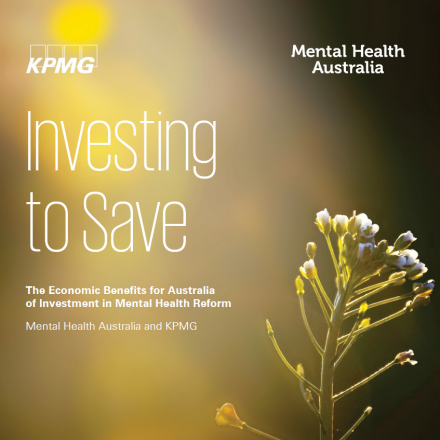“Investing in Need” - Changing Australia’s commitment to investment in eating disorders
 Article by Christine Morgan, CEO Butterfly Foundation
Article by Christine Morgan, CEO Butterfly Foundation
A productive Australia depends on the Government making wise investments in the health of its community and the Butterfly Foundation’s Investing in Need report offers this opportunity.” David Murray, AO – Chairman Butterfly Foundation.
Government now has a strong economic motivator for change in the 5:1[1] return on investment identified in the Investing in Need [2] report, launched for the Butterfly Foundation by Minister Sussan Ley at Parliament House on Monday 2 March.
Butterfly Foundation believes that this should not be the main motivator for comprehensive action for eating disorders – it should always be the health and wellbeing of more than 945,000 Australians.
Eating disorders are serious mental illnesses that require expensive physical and psychological treatment. It can cost more than $100,000 to treat a person with Anorexia Nervosa, which means that if someone is battling Anorexia for a decade, the costs of their foregone productivity and other financial costs could be more than $200,000. This can be a heavy burden to Australia’s health system and productivity, if Australia continues with treatment as usual for eating disorders.
In 2014, there were more than 945,000 Australians who were living with an eating disorder, with less than 30% accessing treatment. Sadly, eating disorders have the highest mortality rate of all psychiatric illnesses, with an estimated 1,941 Australians losing their battle with eating disorders in 2014. Despite these alarming numbers, Australia continues to treat eating disorders as usual without implementing best practice models of care.
Under the current system, in any given year, the majority of people with an eating disorder receive no treatment specifically for their condition. For those who receive ‘treatment as usual’, it is often expensive and ineffective. Some will never recover and one in every ten of those with anorexia will die prematurely, while others struggle with their illness for decades.
Early intervention is critical to treatment of an eating disorder. Having a health system that is set up to intervene early in illness, and deliver the right dosage of treatment for each patient is important for every person with an eating disorder.
There is strong evidence that the best practice (optimal) interventions identified by National Eating Disorders Collaboration - early intervention, stepped care, intensive outpatient and long-term follow up – work effectively to achieve recovery for most people with eating disorders in under two years.
It is estimated that transitioning the current health system to include best practice treatment interventions for eating disorders will take five years at a cost of around $500 million per annum or $2.8 billion. New cases of eating disorders in 2015 and onwards will cost the economy billions of dollars in lost productivity. Every dollar spent supplying effective treatment will pay for itself more than five times over, through productivity gains and other savings.
 Eating disorders cost Australia $103.1 billion (health system, productivity and burden of disease costs). If health expenditures are seen as an investment in productivity, healthy life and preventing avoidable deaths, optimal practice in treating eating disorders would achieve these outcomes. Even from a pure budget revenue perspective, the increased tax revenue on the regained productivity would be up to a 50% more saving to the government than if they paid for the intervention, even if wholly funded by the government.
Eating disorders cost Australia $103.1 billion (health system, productivity and burden of disease costs). If health expenditures are seen as an investment in productivity, healthy life and preventing avoidable deaths, optimal practice in treating eating disorders would achieve these outcomes. Even from a pure budget revenue perspective, the increased tax revenue on the regained productivity would be up to a 50% more saving to the government than if they paid for the intervention, even if wholly funded by the government.
It is clear that the treatment as usual approach needs to be reformed to ensure that the current rate and severity of eating disorders in Australia is arrested.
Butterfly has been working for decades to build a clear case for treatment of eating disorders, which includes understanding and supporting families as they struggle to manage the health system, and the impact of the illness on every aspect of their lives. In terms of human suffering and productivity, the case for change is compelling.
For more information about the Report, contact Christine Morgan, CEO Butterfly Foundation.
Full Report can be found here - Investing in Need - Cost-effective interventions for eating disorders
[1] The benefit: cost ratio is $15.1B:$2.8B = 5.38:1
[2] Deloitte Access Economics 2014 – Investing in Need - cost effective interventions for eating disorders.
__________
Do you have a comment on this story? Join the conversation on Twitter @AUMentalHealth


 Article by Christine Morgan,
Article by Christine Morgan, 

